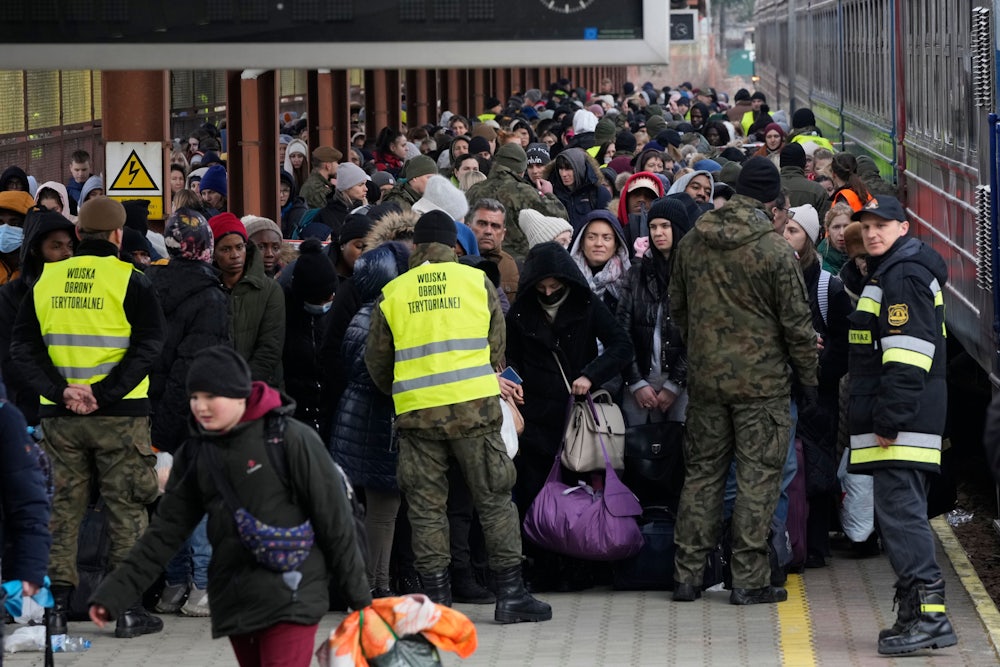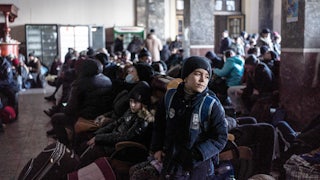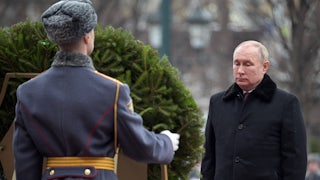Przemyśl, Poland (pronounced SHEH-mihsh-ul), is ordinarily a sleepy place in southeastern Poland. It is a town of about 60,000, sitting about eight miles from the Ukrainian border, with a statue of Pope John Paul II in its center. Przemyśl was once a part of the Austro-Hungarian empire, and its buildings look Viennese rather than Soviet.
Russia’s invasion of Ukraine has turned the town into the first stop in the European Union for refugees fleeing the conflict—and the last stop for those headed into a war zone. The United Nations’ refugee agency estimates that about a half a million people have fled Ukraine since last week, in one of the fastest human migrations in decades. About half are coming to Poland. Przemyśl is directly on the rail line to Kyiv, toward which trains still run. The U.N. is preparing for up to four million to leave the nation of 44 million.
At Przemyśl’s beautiful nineteenth-century railway station, trains from the Ukrainian city of Lviv arrive filled with Ukrainian women and children, as well as foreigners. (Ukrainian men between the ages of 18 and 60 cannot leave the country.) The distance between the two cities is only 60 miles, but the trains are almost always delayed, with some trips taking as long as 26 hours. The station has been filled with people sleeping there (the few hotels are all booked) who come from as far away as Africa and India, fleeing Ukraine and headed for unfamiliar cities farther inside Poland, such as Warsaw and Gdansk. A robust volunteer effort organized by the local fire department and assisted by some recent Ukrainian refugees gives weary travelers sandwiches and hot tea. Arrivals get free SIM cards that work in the EU. Poles with cardboard signs offer free rides to other cities.
While the welcome effort is impressively organized, arrivals universally described the journey from Ukraine as harrowing. Ibrahim Deally, 25, a native of Lebanon, had lived in the eastern Ukrainian city of Kharkiv for eight years, where he had been studying pediatric dentistry. He fled the day of the invasion, on February 24, and arrived in Przemyśl four days later, his journey culminating in a 26-hour train ride from Lviv. As the train was leaving, he said parents were staying behind and pushing their children onto the train. He said Ukraine was scarier than Lebanon: “Here, it felt like something bigger, and more barbaric.”
In the nearby village of Medyka, at the road crossing into Ukraine, the atmosphere was tense. Hundreds of people, many from the Middle East and Africa, were disoriented about where to go. Buses back to Przemyśl were packed. The commuter train ran just every few hours and was not easily marked from the border crossing. Polish guards yelled in English at Africans and Middle Easterners (many of whom spoke Russian) not to crowd the free buses. Fights nearly broke out between those waiting for the bus. Refugees made fires to keep warm. Ukrainians trickled in from the other side of the border very slowly as family and friends waited.
Lyuba Barch, 55, who works at a shoe store in the German city of Darmstadt, was waiting by the road in Medyka for her daughter—who had been stuck in a miles-long traffic jam for 16 hours with her two children, age 4 and 12, and their dog—to arrive from the western Ukrainian city of Ternopil. She described Ukrainian President Volodmyr Zelenskiy as “super” but was irate at the Ukrainian border guards who, she complained, were only letting “expensive cars” through, while leaving others to wait.
Many didn’t have a car at all. Sunday Georje, 27, a native of Cameroon who owns a business in the city of Zhytomyr, walked from Lviv to the border, a distance of about 50 miles with no sizable towns along the way. He said it took three days and he had gotten about “five minutes” of sleep. Temperatures were below freezing, and he reported seeing a dead body along the road. “There shouldn’t be a place in the twenty-first century in civilization for conflicts like this,” he said. He was headed to Warsaw, where he was going to wait and see how the war would play out. He was adamant about returning to Ukraine, where he has lived the past four years, to keep his business.
But the flow of people was not all one way. Others were going to Ukraine. Ukrainian men were headed off to fight after working in other parts of Europe. Humanitarian aid and gasoline was being packed into buses and private cars. Irina Kovalenko, 28, was working in Poland (where an estimated one to two million Ukrainians work and earn higher wages) when war broke out. She said she was headed to the central Ukrainian city of Vinnytsia to try to pick up her 6-year-old son and to try to take her elderly mother to safety. “Yes, of course, I am scared,” she said. “I didn’t believe this would happen. Putin is not a normal, psychologically adjusted person. I hope this ends soon.”
A fresh-faced married couple of 24, who gave their names as Valentin and Yulia, said they also were headed back to Ukraine. Valentin had worked in a discount supermarket in Przemyśl for about half a year and said he was going back to fight. “The whole country is afraid,” he said when asked if he was scared. When his wife was asked the same question, she answered: “Very.”
World War I and World War II changed the borders of Europe. Putin already changed the borders of Europe with the 2014 invasion and annexation of Crimea and may do it once again with brutal force in Ukraine. Depending on how the war goes, Przemyśl could turn into something like West Berlin once was—the last stop in the free world before the Iron Curtain. Or, if Ukraine becomes a member of the EU, there won’t be a border here at all. But for now, it stands as a heroic and ugly transit point, barely five days into a war that could become unspeakably worse.








